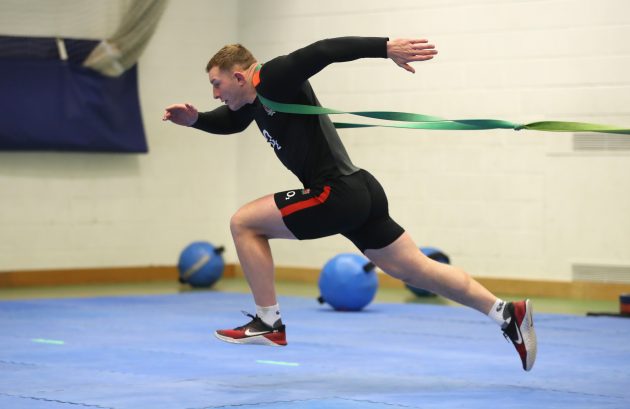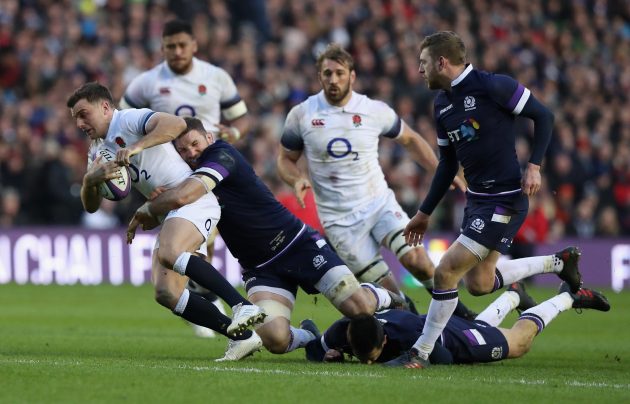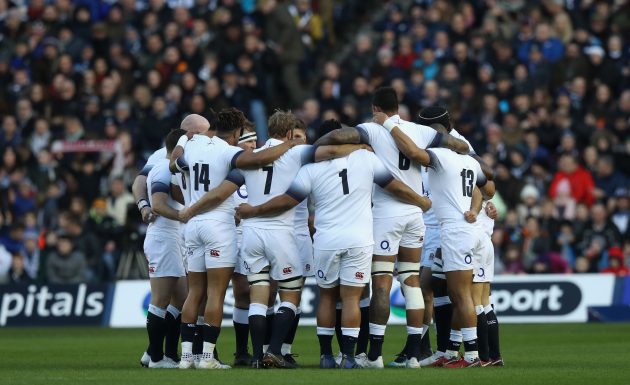Three rounds down, two to play. Former England fly-half Paul Grayson discusses the respective merits of Six Nations title contenders England, Ireland and Scotland
Paul Grayson gives his Six Nations analysis
Do England have serious issues to address after their Murrayfield mauling? Are Ireland good enough to land only a third Six Nations Grand Slam in their history? Can Scotland spring an upset in Dublin? We put these and other questions to ex-England fly-half Paul Grayson in a Q&A…
Was England’s defeat at Murrayfield just a blip or did it expose deficiencies?
“It was inevitable that England were going to lose at some point, and the manner of their defeat was a classic of its kind. They were slightly undercooked; they had been confident in their preparation, talking about the intensity of their training, but they didn’t deliver and Scotland got absolutely everything right.
Related: Scotland 25-13 England Talking Points
If England can take it as a learning exercise, it highlights deficiencies in some of the things they do. They get exposed sometimes in the outside channel, when they press hard in midfield. Jonathan Joseph pushes up and quite often Anthony Watson and Jonny May get disconnected from him.
For Sean Maitland’s try when Scotland went from their 22, there was a long ball over the top from Finn Russell. Joseph pressed and if Jonny May had gone with Joseph there and marked up Huw Jones, the only way Russell could have got the ball wide to Tommy Seymour would have been to kick it, and that gives you a bit of time to recover. The fact that May sat back, while Joseph pressed hard, meant that Russell could make that pass to Huw Jones, who hit that hole between them.
And that’s something that had been highlighted, on the BBC on the Thursday night, we talked about it with Shane Horgan and Matt Dawson as one area that Scotland had an opportunity.

Spoils of victory: Finn Russell’s wizardry did as much as anything to give Scotland the Calcutta Cup (Getty)
And the fact Scotland went the length and England couldn’t recover was down to the quality of Scotland’s attack following the line break. They refused to pick and go or run close, they recycled the ball and didn’t have any unnecessary carries that often kill an attack.
So it was a brilliant finish by them but the fundamental fact is that England have been caught a number of times in that 13-to-wing channel and Scotland got full value from it.
Italy got into that channel a couple of times against England, and Ben Te’o made some excellent tackles actually, and Wales got into that space. It’s the hardest position on the pitch to defend but I do think there is a disconnect at times when England press that hard.”
Is England’s back-row balance wrong?
“Billy Vunipola is an enormous miss for them. If you think how good he was before his injuries, he’s a triple-double man – double-figure carries, passes and tackles, plus a couple of turnovers. Huw Jones ran between Owen Farrell and Nathan Hughes to score at Murrayfield. Vunipola doesn’t miss that tackle for me. Nathan Hughes coming back from injury, very good player that he is, isn’t Billy Vunipola. Vunipola automatically gives more options in the back row because he fulfils an 80-minute international-class No 8’s role.

Huge loss: Saracens’ Billy Vunipola on the charge v Ospreys in January, when he broke his arm (Getty)
“Not having your openside nailed down is another problem. Courtney Lawes is a second-row who can play six. Chris Robshaw is an international-class No 6, that’s his position. So England’s policy isn’t right, but if you had Billy Vunipola back on the field that would completely change the dynamic, because of how good he is.
One of the second-rows has to miss out. England are better with Robshaw at six. And then there’s a fight for the seven shirt. England don’t create enough turnovers. Nigel Owens refereed the breakdown so that there didn’t have to be a huge release. Players could stay in the breakdown; the merest hint that you’re off the ball and he let players compete. Scotland did it brilliantly and England couldn’t adapt to how he was refereeing. He doesn’t over-communicate, he lets you get on with it, and Scotland certainly won in that area.
I think you’ve got to let Sam Underhill go, say ‘go on then, see if you can make it stick’, because he has the potential to develop into that Pocock-type player, he’s the right shape for an openside. I think that’s the way to go because (currently) it’s square pegs in round holes.

Man for No 7? Sam Underhill, now out with a toe injury, deserves an extended run, says Grayson (Getty)
With everybody fit, England have good balance but the openside’s job is not as clear as it should be at the moment because England’s best No 8 isn’t fit. Hughes has just come back from injury and Sam Simmonds is a brilliant player but plays the game in a completely different way to the traditional No 8; that upsets the balance and it means your seven is doing more work in other areas than he should be. It is a big area for England to develop in.
What about second-row selection?
“England have got so many resources in the second row that you almost feel they need three of them on the field at once. That’s an interesting area in terms of blend. Obviously it’s coloured by who’s available in the back row. Courtney has been a dynamic ball-carrier this season but England couldn’t get him on the ball against Scotland.
What is England’s best second-row pairing? Courtney on the form he showed at the start of the season would be in it. Joe Launchbury has forced his way back into the action and obviously Maro Itoje’s a key figure for England. But (pick) two out of those three, I’m not certain what is the best blend.”

Different shirt: specialist lock Courtney Lawes is playing at six – a compromise some disagree with (Getty)
Any other areas that concern you?
“The half-backs are interesting. With Ben Youngs being out, Danny Care and George Ford at times look sharp but at other times, when the game is going away from England… it’s an interesting change when Te’o comes on at 12 and Farrell goes to ten. And Richard Wigglesworth comes on at the end and you sort of have that Saracens axis, which gives England some direction but less creativity.
And if you’ve got doubts about whether Ford can bring you back into a game when you’ve perhaps got to chance your arm more, putting Te’o to 12 and Farrell to ten doesn’t give you any more creativity, you’re going to play a particular way.
And if, as against Scotland, a defence can stand up to it, it’s a limiting change as opposed to going the other way: Farrell starts the game and you have that bit more ballast in midfield, then with 20 minutes to go and you need to change the game somehow, you’re bringing creativity and a bit of devil off the bench, as opposed to the other way, starting with that player in George Ford. And then your change-up is to go less creativity, more certainty.
I think that’s an interesting dynamic going forward, as a discussion piece for England going forward. Which way round do they do it?

Centre stage: Ben Te’o, training this week at Pennyhill Park, has a big part to play for England (Getty)
I think Ben Teo’s got a part to play. If you’re going to play him, he’s more effective as a 13 than a 12. Because a route one, strong-running 12 you can deal with; (but) a little bit more ball-playing and creativity inside you, more space running in that slightly wider channel, picking some of the lines that he did last year coming off the bench, he’s a real handful.
So the Joseph-Te’o conversation will be one that runs on. And then if you’re going to use him as a 12, there need to be some games where you play Farrell at ten, Te’o at 12 and Joseph alongside him because you need to build some relationships at some point. The clock is ticking and there are summer tours.”
How do you assess Ireland?
“They get their opportunity, don’t they, at home against Scotland. At this point we’re talking about that last game at Twickenham being a Grand Slam decider.
I think Ireland, having dodged a bullet in France, and having played as well as they did with all the injuries they had against Wales, have got one hand on the trophy. I don’t know whether England are capable of going to Paris and getting five points. But I do think Scotland, although they don’t travel particularly well, will be so buoyed by that Calcutta Cup result that it almost plays into Ireland’s hands – there will be absolutely nothing taken for granted.

Lots to smile about: Ireland fans could soon be celebrating the country’s third Grand Slam (Getty)
Ireland are further down their path than England, and everybody knows that Johnny Sexton is their match-winner. He’s their general, he’s got the team at his command and the players absolutely trust that he will pull the right lever at the right time.
Albeit he missed a kick or two against Wales, I thought he was magnificent. That brings certainty around him, there’s no debate about who plays fly-half for Ireland. And there’s no debate about they play. So that for me is advantage Ireland, because in those central key positions, nine and ten, the game plan and the way they play, they’ve got absolute certainty.
I would have Ireland as narrow favourites (at Twickenham), and then factor in the Twickenham effect. If England win in France, the pain of the Scotland defeat isn’t going away, and there will be a certain amount of that saved up for Ireland. But all that being said, I would have Ireland as narrow favourites.”

Top of his game: Keith Earls leaves Welsh defenders behind in Ireland’s third-round win in Dublin (Getty)
So you are expecting an Irish Grand Slam this year?
“Yes, and I think that would be the making of Joe Schmidt’s team. Beating England last year was all well and good but there has to be a day where you put it all together; potential must be realised, otherwise you’re never a great team. Ireland have the opportunity to write themselves into that a year out from the World Cup.
Ireland have other points of difference. Like Keith Earls for example, he’s a magnificent player who’s playing spectacular rugby. And guys like Jacob Stockdale and Garry Ringrose in the background. Behind the scrum there are young Irish backs who look very comfortable at international level straightaway, and have had some really good experiences.

Duck to water: Ireland wing Jacob Stockdale has taken to international rugby very comfortably (Getty)
Then there are game-changers; Tadhg Furlong is something a bit different, he’s a tighthead who is not only the fulcrum of a strong scrum but has a pivotal role to play in the way you shape your attack, not just as a ball-carrier but as a ball-handler as well. He’s the real deal.
So I think around the detail and the understanding of the way they play, they have a group of players who’ve got some real quality, and not just the As, Bs and Cs of their job but a bit of X-factor in there as well.”
Can Scotland win in Dublin this weekend?
“I don’t think Ireland will make as many mistakes as England did at Murrayfield, which makes it a lot harder for Scotland. Defensively they won’t be given as many opportunities.
Related: Ireland v Scotland Preview
But actually talking about the Calcutta Cup game, Scotland asked Finn Russell to make the right calls at the right times and they largely did that. Scotland kicked the ball brilliantly in the second half. They didn’t get over-tempted to run the ball out of their own half. Mike Brown sends a spiral down the tram-lines, Stuart Hogg picks it up, runs 20 yards and drills it cross-field into touch. They’re big moments for the team and it didn’t come from running with the ball, it came from ‘now’s the right time to kick it’.

Cutting edge: Huw Jones scores the second of his two tries v England at Murrayfield (MB Media/Getty)
They scored their first try from a maul. They caught England out, it was a decent maul, got a penalty advantage, Russell plays the grubber kick. They were a bit lucky with the bounce of the ball but unless the maul goes right you haven’t got that advantage.
They chose not to defend England’s maul, they stepped back. At the right time they played quick; there was a lineout and the ball was back in play in less than ten seconds. England weren’t ready for it and Scotland were off and running again.
So while there are always calculated gambles in the way they play, when they’re on and they’re making good decisions like that they’re a very difficult team to stop.
“Scotland’s way will not always win games but it will be exciting to watch”
What they’ve got from this championship so far, with eight of their front row out injured, is precious strength in depth. WP Nel comes back on against England and is rock-solid in the scrum. So they’re building. Their way will not always win games but it will be exciting to watch and it will get harder for them because if people weren’t taking them seriously before, they absolutely will be now.”
Which players in the championship have impressed you?
“I really like Matteo Minozzi, the young kid for Italy at full-back. He just looks like a naturally gifted rugby player to me. And Italy are searching for one or two people just to bring a bit of spark. This lad just might have it, at this level.
I’ve been impressed with John Barclay. I think his honesty, after their first-round defeat against Wales, the way that he spoke and the way they’ve responded as a team and how he’s played, I really like that because he’s a good leader. You can see his response to a poor performance and he’s pretty impressive.

Captain’s example: John Barclay tackles George Ford as the English juggernaut is halted (Getty)
Those two are one fledgling, one emerging leader. For one established go-to guy, it has to be Johnny Sexton. Ireland are in the position they are now because of what he did in the last couple of minutes in Paris. If they end up going for a Grand Slam at Twickenham, it’s because he managed, after 40-odd phases, to nail one of the best drop-goals you will ever see.
In that moment he’s judged that France are out on their feet but so are Ireland. They’ve got nothing more to give. I think they could still be playing now and Ireland wouldn’t have got across the line. It was the moment when Klitschko and Anthony Joshua were out on their feet and couldn’t throw another punch. They stood and looked at each other, didn’t they?

Main man: Johnny Sexton is Ireland’s general and brings certainty to all they do (Sportsfile/Getty)
And that was that moment, France and Ireland were done. And Sexton knew that and dropped a goal from 45m. And to deliver that kick, and make that judgment call, was magnificent. For Ireland, that’s what he’s meant to do. That has given them a chance of a Grand Slam. He delivered that killer blow.”
Have you identifed any tactical trends in this championship?
“There’s been a bit of rebalancing in the way teams attack. Obviously the law changes and breakdown stuff have meant that it’s easier to keep the ball for more phases, but teams have moved away from too many passes behind players.
You see it in the way Scarlets attack, you see it in the way Wales attacked Scotland; once teams are getting into the middle of the field, there was a time when it would go behind one player to another player. Teams now are starting to understand the value of flatter passes, not having too many players ahead of the ball, and getting into those wide channels. Wales have done it particularly well, where you’ve got maybe a fly-half, a centre, a back-row, a full-back/wing.
Forwards are now being used rather than missed, so flat attack, more rugby union, less rugby league attack. It makes the game much more exciting. The teams that use it best, when you get on top of a defence, you don’t let them recover with a pull-back ball.
Scotland’s try from their 22, the first pass was out the back to Finn Russell to buy time but the next one was flat as a pancake. A bullet. So it looks easy on the eye. It’s difficult to do but when it works it looks fantastic.”






